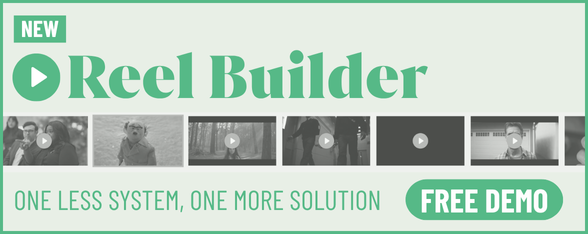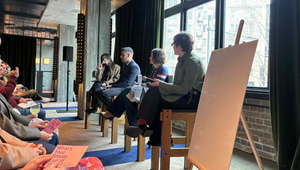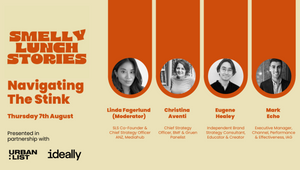
“It’s Far Too Easy to Be Cynical”: First Smelly Lunch Stories Panel Shares Stories of Optimism Over Ukrainian Food

“It’s not just saying, ‘do diversity because it's good for the bottom line.’ It's much bigger than that. This is not a financial argument. It is a moral argument,” Dentsu Creative’s Graham Alvarez-Jarratt said of diversity at yesterday’s inaugural Smelly Lunch Stories (SLS) event.
“We are here because we are optimistic, it’s far too easy to be cynical. Your attendance is, in and of itself, a radical act of belief,” he said, thanking the audience for coming.
This brought fellow SLS co-founder and head of marketing at BWS, An Le, to tears. “I’m okay,” she clarified, “I'm just so overwhelmed that everyone's here. This is real. It means a lot to us.”
The panel was moderated by Camey O’Keefe, director of Gambol Creative, and featured Chris Wirasinha, co-founder of Pedestrian and CEO at Linkby, Rose Herceg, ANZ president at WPP, and An at a social enterprise kitchen in Sydney, Kyïv Social.
Each panellist shared their own ‘smelly lunch story’ from their childhood, and discussed their experiences in the industry. An said she wanted to “fit in” and how important it was to her to “look the part.”
“I always felt not that I didn't belong, but I was very aware of how different I looked. I worked harder to fit in. My dress sense probably came from that because I thought I had to look a part. I don't want anyone to say that I don't belong here,” she said.
Chris mentioned he faced parental pressure to choose a job that was deemed “more important” or “safer”.
“Law or medicine are safe careers. You stay in the same job, you'll get paid more and more, and you'll be able to raise a family and have a safe existence,” he said.
“And that's where I think the leadership and role models make so much sense. Because if you've got people can point to and go, ‘Look at them. Look what they've done. I want to do the same thing they did.’ That actually has huge impacts on those communities.”
Rose noted 51% of Australians are migrants or come from migrant families, across more than 290 nationalities.
“These numbers are very real, and they are also the markets and the consumers that buy the products and services that the company boards are selling. So I think we need to draw a straight line between the boards of those companies, the customers that they're selling to, and the fact that more of Australia is us [migrants] than any other time in Australia's history. I'm just not sure that we're very good at telling that story.”
The panel discussed unconscious bias, and spoke about changing their names to suit their school or work environment, for example. Companies should acknowledge unconscious bias exists, and dismantle it through empathy and education, they said. An recognised her own unconscious bias.
“Whenever I have a marketing director or a CMO, I'm like, ‘Oh, what is my next boss is going to be?’ and I have a picture in my mind of what they look like, and I think we all do,” she said.
“That bias is what potentially stops us from progressing further. I put a ceiling on myself in a lot of ways. Because I still can't see it. I still can't see going further.”
The panel’s advice for the audience ranged from starting cultural initiatives similar to SLS into to sharing stories and getting to know the people they work with.
“I would love to see more non-minority people in the room,” Linda Fagerlund, SLS co-founder added. “I think that, for me, will be a sign of change, real change, because we truly created a safe enough space where people who might not actually have a smelly lunch story can come in, feel invited to participate in this conversation and be part of it.”












